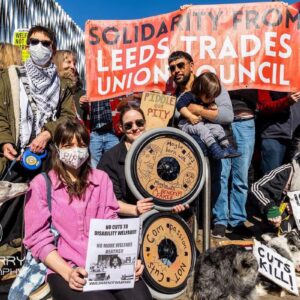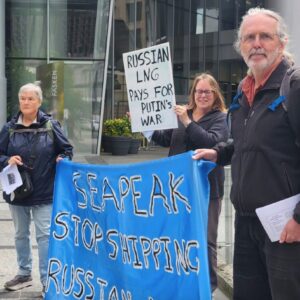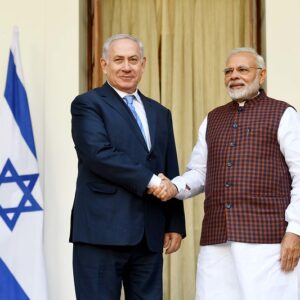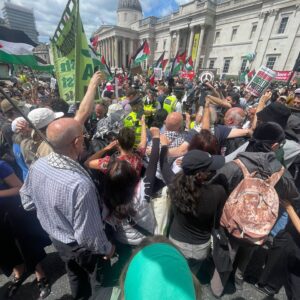What is the reality of the debate over Ukraine at Congress 2023? The Stop the War organisation is trumpeting the passing of a Stop the War motion at UCU congress as a significant victory. This motion was carried by a majority of 9 votes. Here is a more detailed account of what happened.
UCU did not take any positions on Ukraine at its 2022 Congress. Two motions were submitted for debate at UCU Congress 2023: one from the NEC proposing humanitarian and education solidarity work and another from a Stop the War perspective, which most controversially called on the UK government to stop arming Ukraine.
Prior to the congress the Ukraine Solidarity Movement organised an online fringe for UCU congress delegates. The speakers were John McDonnell MP, Denys Pilash, Political Scientist from Taras Schevchenko National University, Kiev and Ukrainian Social Movement and Volodymyr Fundovnyi of the Free Trade Union of Education and Science of Ukraine. This meeting attracted a fairly small audience, but also had some subsequent viewings. Together with a leaflet distributed at the UCU congress (held in Glasgow on 27-29 May), this helped some delegates to hear the Ukrainian perspective and not just assume automatic support for a Stop the War motion.
Building support in UCU for a position of solidarity with Ukraine involved addressing a number of issues.
Many UCU members, like other trade unionists, have in the past supported Stop the War from the time when Stop the War opposed the invasion of Iraq in 2003. UCU’s affiliation to Stop the War dates back many years. It can be a default response to assume support for Stop the War. A motion with ‘peace now’ in the title sounds immediately appealing.
Moreover, many UCU activists arrived at congress having been very busy with union work organising industrial action ballots, picket lines and a marking and assessment boycott. This means the amount of time for careful reading and scrutiny of Congress motions was even more limited than usual. This does not excuse the vote, but it helps to explain it.
Trade unionists often think of themselves as reasonable people who prefer to negotiate rather than take industrial action. This means they respond positively to calls for ceasefire and negotiations. Again, this can make a Stop the War motion sound appealing.
Trade unionists should, however, also be aware that it is not possible for a union to negotiate with an employer who will not recognise them for purposes of collective bargaining and is resolved to smash the union. So, trade union experience can also be mobilised to understand why the Ukrainian people are right to resist and need weapons, and to understand why the position of Putin, in denying that Ukraine is a separate country, is a major obstacle to negotiations.
When there is talk about peace and a negotiated settlement, it is important to ask people to think about what sort of peace and what sort of negotiated outcome.
Leeds University UCU put in an amendment to the Stop the War motion. While this amendment could not entirely remove the proxy war narrative of the Stop the War motion, it blunted the edge by inserting phrases about ‘self-determination for Ukraine’ and that a peaceful resolution must be ‘based on freedom and independence for Ukraine’ and ‘acceptable to the Ukrainian people’. The amendment deleted the call for the UK government to stop arming Ukraine. The amendment was useful in drawing delegates’ attention to what was wrong with the Stop the War motion.
The debate on Ukraine was held on the Saturday morning of UCU congress. The two motions were debated separately. In the debate on the Stop the War motion (Motion 5) there were speakers for and against the motion and the amendment. These came from a variety of political perspectives within the union. Like Brexit some years earlier, this issue cut across political groupings within UCU.
The Leeds University amendment was defeated: for 113, against 146, abstentions 28
The Stop the War motion was carried: for 130, against 121, abstentions 37
These figures are interesting and worth commenting on. The amendment was defeated by 33 votes. Normally when this happens one would expect a bigger majority for the substantive motion. Instead, the substantive motion was carried by a narrow margin of 9 votes. Also, the number of abstentions increased by 9. The voting figures suggest that some delegates were wrestling mentally with the issues and that some were hearing the debate and realising at least some of the problems with the Stop the War motion.
The NEC motion: Solidarity with Ukraine: supporting education and humanitarian work was carried overwhelmingly, without a count. This motion has positive features. It not only condemns Russia’s invasion of Ukraine (as the Stop the War motion did) but also recognises Ukraine’s right to self-determination. It addresses support for refugees and calls for cancellation of Ukraine’s national debt.
There was one speaker in opposition to the NEC motion who voiced concerns about debt cancellation. Some of this opposition seems to be based on concerns about money-laundering or money for oligarchs or the armaments industry. It would be good for more campaign materials to be produced about how debt cancellation would work and why it should be supported.
Furthermore, the NEC motion tasks the UCU NEC’s International Working Group with developing programmes of practical solidarity, including online meetings with Ukrainian trade unionists and feminists. Hopefully this motion can be built upon to increase understanding within UCU of the situation in Ukraine and the need for solidarity.
Since the congress two statement have been circulating within UCU. One from a Ukraine solidarity perspective supports implementation of motion 6 and calls on those members angry or unhappy about the passing of motion 5 to remain within UCU and seek to change the policy through the democratic processes of the union, that is through a vote at a subsequent congress. This petition is drafted from a perspective which understands why some Ukrainians and their supporters may be totally outraged at a call on the UK Government to stop sending arms to Ukraine. The other statement defends motion 5 and shows no comprehension of why Ukrainians are upset at the content of the Stop the War motion.
What wider conclusions can be drawn from the debate on Ukraine within UCU, which may be relevant to other trade unions?
It is important to discuss the nature of support for the Stop the War motion. Some of this is from members of political parties who hold fast to a 1914 scenario in which this is purely a war of inter-imperialist conflict. In this scenario socialists have no interest in which side wins the war and there is no good way forward for Ukrainian workers. The only options are total dominance by Russian imperialism or by USA/NATO/European Union and imposition of a neo-liberal economic programme. The work of Ukrainian trade unions and the Ukrainian Social Movement demonstrates that there are other choices for the future of Ukraine.
This dismal perspective of only being dominated by one imperialist power or another is paradoxically held by people who are often good in other contexts at resisting voices of doom who believe workers can never win. It led the writers of the Stop the War motion to argue that:
‘Wars are fought by the poor and unemployed of one country killing and maiming the poor and unemployed of another.’
This view has caused considerable offence among Ukrainians, who have replied that Ukrainians from all walks of life have volunteered to fight in the Ukrainian armed forces. The Stop the War motion simply reproduced a cliché without any contact with Ukrainian realities or recognition of the character of a people’s war.
Some of the support for the Stop the War motion arises from a pacifist or semi-pacifist position. This is a view that needs to be debated, including with reference to wars and armed struggles that the left has supported previously.
Another issue which needs further elaboration and emphasis is the distinction between support for the right of the Ukrainian people to access arms from any source where they can obtain them and support for NATO and Western imperialism. This should also be linked to the position that solidarity should be unconditional and that countries which supply arms to Ukraine should not try to dictate to Ukraine the terms of a future peace settlement.
There was also a layer of UCU Congress delegates who were hearing both the argument about the dangers of escalation and nuclear war – the putting ‘fuel on the flames’ by sending weapons argument – and the argument that condemnation of the Russian invasion and support for Ukrainian self-determination make little sense if followed by denying Ukrainians the weapons to defend themselves. These members can be won to a position of solidarity with Ukraine.
What is the way forward in UCU? There is a need for engagement in practical solidarity work and educational work to ensure that Ukrainian voices are heard.
If you generally agree with this article and you are member of the UCU, please sign this “Statement on Ukraine following UCU Congress 2023” >>> https://tinyurl.com/bd25f2kt
Art (53) Book Review (121) Books (114) Capitalism (65) China (79) Climate Emergency (98) Conservative Government (90) Conservative Party (45) COVID-19 (44) Economics (40) EcoSocialism (55) Elections (83) Europe (46) Fascism (56) Film (49) Film Review (68) France (70) Gaza (60) Imperialism (98) Israel (124) Italy (46) Keir Starmer (52) Labour Party (111) Long Read (42) Marxism (48) Palestine (169) pandemic (78) Protest (152) Russia (340) Solidarity (142) Statement (48) Trade Unionism (141) Ukraine (346) United States of America (132) War (368)
Latest Articles
- Arse backwardsArse backwards is an apt way to express how disabled people are treated argues Sandra Wyman
- Stop Seapeak’s sanctions bustingFred Leplat argues that the campaign against Seaspeak needs stepping up
- On the illegal Israeli aggression against IranA statement by Radical Socialist India
- Anti‑austerity protest – 7 June 2025 – ACR bulletin FIght for EcosocialismThe ACR bulletin for the 7 June anti-austerity protest called by the People’s Assembly.
- British government declares Palestine Action terroristsThe Labour government at Westminster proscribing Palestine Action as a terrorist organisation is a ridiculous undemocratic move by a government that only exists to perpetuate war and capitalism, argues Simon Hannah





